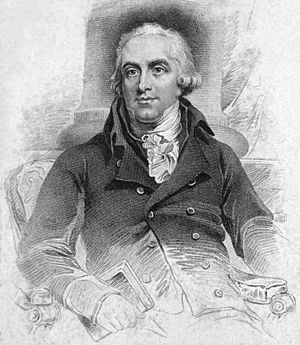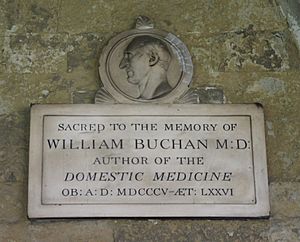William Buchan (physician) facts for kids
Quick facts for kids
William Buchan
|
|
|---|---|

William Buchan
|
|
| Born | 1729 Ancrum, Scotland
|
| Died | 1805 (aged 75–76) |
| Occupation | Scottish physician |
William Buchan (born in 1729, died in 1805) was a Scottish doctor and writer. He is famous for his book, Domestic Medicine. This book helped everyday people understand how to prevent and treat illnesses.
Buchan wanted to make medical knowledge available to everyone. His book was incredibly popular. Over 80,000 copies were sold during his lifetime. It was printed in 19 different versions and translated into many languages. People in Europe and even in the Americas used his book.
Contents
Life Story of William Buchan
Early Life and Education
William Buchan was born in Ancrum, Scotland, in 1729. As a young boy, he went to a local grammar school. He was very interested in medicine from an early age. Even without formal training, he sometimes helped as a village doctor.
In 1749, he started studying at Edinburgh University. His family wanted him to study religion. But he soon changed his studies to math, plants, and finally, medicine. He finished his medical studies in 1758, after about nine years at the university.
Starting His Medical Career
After university, Buchan opened a small medical practice in Yorkshire. In 1759, he became a doctor at the Foundling Hospital in Ackworth. This hospital cared for abandoned children. He worked a lot with children there.
In 1761, he wrote about how too many babies were dying in Great Britain. He called his work On the Preservation of Infant Life. Sadly, not many people paid attention to his ideas at the time.
Family and Later Practice
Soon after, Buchan married a woman from the Dundas family. This was a well-known family in Scotland. Later that year, the government stopped funding the Foundling Hospital.
So, Buchan moved his practice to Sheffield. He worked there from 1761 to 1766. Then he went back to Edinburgh. In Edinburgh, he had his own practice. He also gave talks about science and how the world works. His son, Alexander Peter Buchan, was born in Sheffield in 1764. He also became a doctor, just like his father.
Publishing Domestic Medicine
William Buchan published his most famous book, Domestic Medicine, in 1769. The first book cost only six shillings and was a huge success. As mentioned, it sold over 80,000 copies and had 19 editions. It was translated into almost every main European language.
People in faraway places, like Brazil, even used the Portuguese version of his book. In 1772, Buchan became a member of the Royal College of Physicians of Edinburgh. This was a big honor for doctors.
Moving to London
In 1778, Buchan tried to become a professor at the Institute of Medicine. But he did not win the election. Later, he moved to London. He practiced medicine there until he passed away on February 25, 1805. He is buried in Westminster Abbey, a very famous church in London.
William Buchan's Important Works
About Domestic Medicine
Domestic Medicine was first published in 1769. It was printed in Britain until 1846 and in the Americas until 1913. Even Catherine the Great, the empress of Russia, was very impressed by the book. She sent Buchan a gold medal and a personal letter.
This book was special because it was the first of its kind. Before Buchan's book, most medical texts were either too difficult for regular people to understand or too short to be helpful. Domestic Medicine combined these styles. It was written in simple language so more people could read it. It explained diseases and treatments clearly. This allowed people to try to cure themselves. Only one other doctor, Samuel-Auguste Tissot, wrote a similar book. Buchan said Tissot's work influenced him.
Buchan's book reached more people than Tissot's. This was because he wrote about new health problems. For example, he discussed illnesses that affected factory workers. His book came out around the start of the Industrial Revolution. Factory workers found it very helpful. These ideas about industrial diseases were based on what he heard, not always on direct study. But the promise of better health made people support his book.
Domestic Medicine was also one of the first books to focus on preventing diseases. The first part of the book talks about how to avoid many illnesses. This included getting vaccinated against smallpox. Buchan believed in strict hygiene and cleanliness. He even thought that people who behaved badly were more likely to get sick.
While his book was new in many ways, some of his ideas were still based on older medical beliefs. For example, he believed in humorism. This was an old idea that health depended on a balance of four body fluids. Buchan also strongly believed in bloodletting and purging as cures. These methods involved removing blood or making the body get rid of things. The idea was that if the body could expel infections, it would become healthy again. Buchan also said it was important to keep track of things like air, food, sleep, exercise, and emotions. He thought too much of one thing could cause an imbalance and lead to illness.
William Buchan's Death
William Buchan passed away on February 25, 1805. He was 76 years old. He was buried in Westminster Abbey in London.
See also
- Domestic medicine
 | Emma Amos |
 | Edward Mitchell Bannister |
 | Larry D. Alexander |
 | Ernie Barnes |


